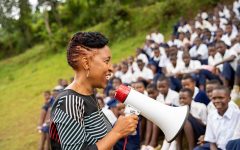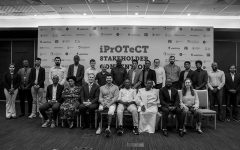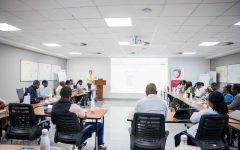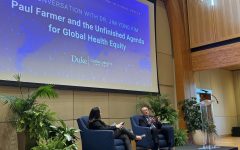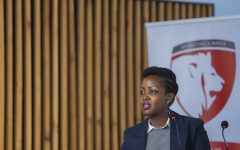Student Profile: Dr. Richard Nduwayezu MGHD ‘19
December 16, 2018 2018-12-16 18:07Student Profile: Dr. Richard Nduwayezu MGHD ‘19
In October 2018, members of the global health community gathered in Astana, Kazakhstan for the Global Conference on Primary Health Care, where the health sector renewed its commitment toward Universal Health Coverage and the Sustainable Development Goals. The gathering marked the 40th anniversary of the historic Alma-Ata Declaration, a global agreement that expressed the need for urgent government and health sector action to protect and promote the health of individuals across the globe.
Among the attendees at this year’s high-level conference was Dr. Richard Nduwayezu MGHD ‘19. Richard was selected as a delegate along with 10 other global health professionals by the United Nations Major Group for Children and Youth. In addition to attending the conference, he spoke at a parallel Ministerial Session and served as a panelist for a discussion on “Equitable Primary Health Care for Women, Children, Newborn and Adolescents.”
The opportunity to attend the conference, share his community and social medicine insight, and learn from the highest level of global health leadership was invaluable for Richard, but his recent accomplishments and journey toward the MGHD program began years earlier.
In 1997, Richard was living with his family in the Democratic Republic of the Congo (DRC) when his father fell ill and passed away. “I remember wishing that I could have the skills to do something,” he reflected. “I knew then that I wanted to become a doctor and make an impact in my community, but that I would need to work hard to accomplish this.”
Richard pursued his Bachelor of Medicine, Bachelor of Surgery at the University of Rwanda and graduated in 2016. During medical school, he participated in a student leadership group that delivered health education workshops in underserved communities. According to Richard, the workshops served as his first brief exposure to social determinants of health; he learned that one’s health was affected by more than just diagnostics, and factors such as poverty and education played an enormous role in one’s state of well-being.
This exposure intensified when Richard graduated and began practicing as an intern doctor at Kibagabaga District Hospital.
“The challenges that I observed were not due to lack of clinical knowledge, but a patient’s inability to afford direct services,” Richard said. “It made me realize that health equity was a critical but neglected lens of patient care.”
Richard’s burgeoning interest in the concept of health equity led him to apply for a Global Health Corps fellowship, an accelerator program that places young professionals at partner global health organizations across the US and East Africa. He was accepted and joined the Health Builders staff in Rwanda as a Clinical Services Associate, supporting the organization’s work in Rwamagana, Nyabihu, and Rulindo District in advancing health management activities to improve the provision of basic primary health care.
Richard’s time at Health Builders inspired him to investigate additional avenues that would allow him to develop skills needed to lead health programs from a lens of equity. With its focus on management, leadership, and principles of health, UGHE’s Master of Science in Global Health Delivery proved to be the perfect fit, particularly as case studies honed in on Rwanda as an example of effective health systems strengthening.
Now that Richard has completed his first semester of the year-long, full-time MGHD program, he’s able to reflect on the innovative education he is receiving and the immense growth he has experienced.
“The best part of UGHE is how we incorporate the principles of global health delivery into all of our courses,” says Richard. “As we explore implementation science, it gives us a roadmap for how we can address community health interventions as well as measure and address gaps in health policy.”
Richard’s passion for advancing health equity has taken him to new lengths, both as a faculty member in community and social medicine for the University of Rwanda, and as a Universal Health Coverage advocate at the Astana conference.
“In Rwanda, we should continue to embrace the opportunity of good leadership to sustain our achievements and invest in health professional education to increase the number of providers while retaining qualified personnel.”
Following UGHE, Richard hopes to advance his career in the direction of clinical education and academic leadership. With his focus on community-based social medicine, constant reflection on the future of quality health care, and passion for the field of global health, it’s likely the world will see him championing health equity at many conferences in the years to come.

